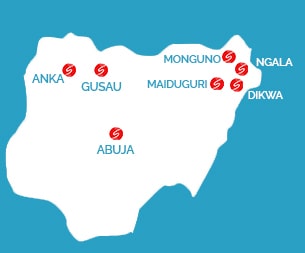In north-eastern Nigeria, armed groups such as Boko Haram factions have now been raging since 2009, clashing with Nigerian armed forces, forcing people to leave their villages. The city of Dikwa, which already hosts 14 Internally Displaced People (IDP) camps, faces a considerable lack of space.
At the beginning of May 2018 and the start of the “Last Hold” operation launched by the Nigerian army against armed groups in Borno State, some 3,000 displaced people have arrived and another 3,000 are expected, mainly women and children.
Arthur Maurus, Deputy Country Director in Nigeria for SOLIDARITÉS INTERNATIONAL
To protect its inhabitants from the conflicts that erupt in the surrounding area, the city of Dikwa is located in a trench. “However, with the massive arrival of displaced people, the city lacks more and more space to welcome them, and its configuration does not allow to gain in surface area,” says Arthur Maurus.
PROVIDE EMERGENCY ASSISTANCE
When they arrived in Dikwa, families were gathered in a transition camp, in which they had no access to any basic services. Therefore, SOLIDARITÉS INTERNATIONAL teams intervened to provide them with drinking water. Subsequently, 300 shelter kits were distributed to the new comers, allowing nearly 1500 people to join one of the camps, in which the welcoming conditions are better.
“The beneficiaries of these shelters are mainly women and children, weakened by the hardships they have gone through to get there,” says Arthur Maurus. “SOLIDARITÉS INTERNATIONAL has hired people from the community to help build these shelters, not only to help the most vulnerable people, but also to participate in the city’s economic recovery.”
PROVIDING ACCESS TO BASIC SERVICES
SOLIDARITÉS INTERNATIONAL teams work in 3 of the existing camps in the city, helping nearly 27,000 people. They are building latrines and showers, and drilling boreholes to provide families with access to clean drinking water. Hygiene promotion sessions are also being set up, as well as cholera prevention and treatment measures.
These interventions are supported by the European Union (ECHO) and the United States (OFDA).
Help us support people in Nigeria
DONATE
© Constance Decorde / SOLIDARITÉS INTERNATIONAL
Nigeria
Context and action- 216.7 million inhabitants
- 163rd out of 191 countries on the Human Development Index
- 196.907 people helped

